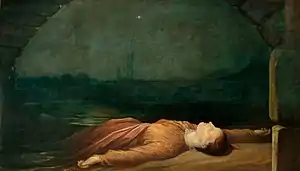The Bridge of Sighs (poem)
"The Bridge of Sighs" is a famous poem of 1844 by Thomas Hood concerning the suicide of a homeless young woman who threw herself from Waterloo Bridge in London.

Background
Although Thomas Hood (1799–1845) is usually regarded as a humorous poet, towards the end of his life, when he was on his sick bed, he wrote a number of poems commenting on contemporary poverty. These included "The Song of the Shirt", "The Bridge of Sighs" and "The Song of the Labourer". "The Bridge of Sighs" is particularly well-known because of its novel meter, complex three syllable rhymes, varied rhyming scheme and pathetic subject matter.
The poem describes the woman as having been immersed in the grimy water, but having been washed so that whatever sins she may have committed are obliterated by the pathos of her death. She seems to have committed suicide by jumping off a bridge, after she was thrown out of her home.
Make no deep scrutiny
Into her mutiny
Rash and undutiful:
Past all dishonour,
Death has left on her
Only the beautiful.
Several clues in the poem, which harps upon beauty, sins and scorn, hint that the woman was pregnant and had been thrown out of her home.
Sisterly, brotherly,
Fatherly, motherly
Feelings had changed:
Love, by harsh evidence,
Thrown from its eminence;
Even God's providence
Seeming estranged.
Illustrations
The poem was widely anthologised and frequently illustrated in books of Victorian poetry, including an etching by Sir John Everett Millais in 1858. It was also set to music by Reinhold Ludwig Herman (1849–1919). Along with Hood's other notable serious poem, The Song of the Shirt, it influenced several Victorian artists. Paintings inspired by the poem included Augustus Egg's Past and Present (1858; Tate, London), Abraham Solomon's untraced Drowned! Drowned! and G.F. Watts's Found Drowned (Watts Gallery, Compton, Surrey).[1] The poem was also illustrated in a bas-relief on Hood's tomb.
Former Procul Harum guitarist Robin Trower released a certified Gold album of the same name with the title track song Bridge of Sighs in 1974
External links
- The Bridge of Sighs, text of the poem.
- L. J. Nicoletti, Downward Mobility: Victorian Women, Suicide, and London's "Bridge of Sighs"
- The Bridge of Sighs audio, from Archive.org.